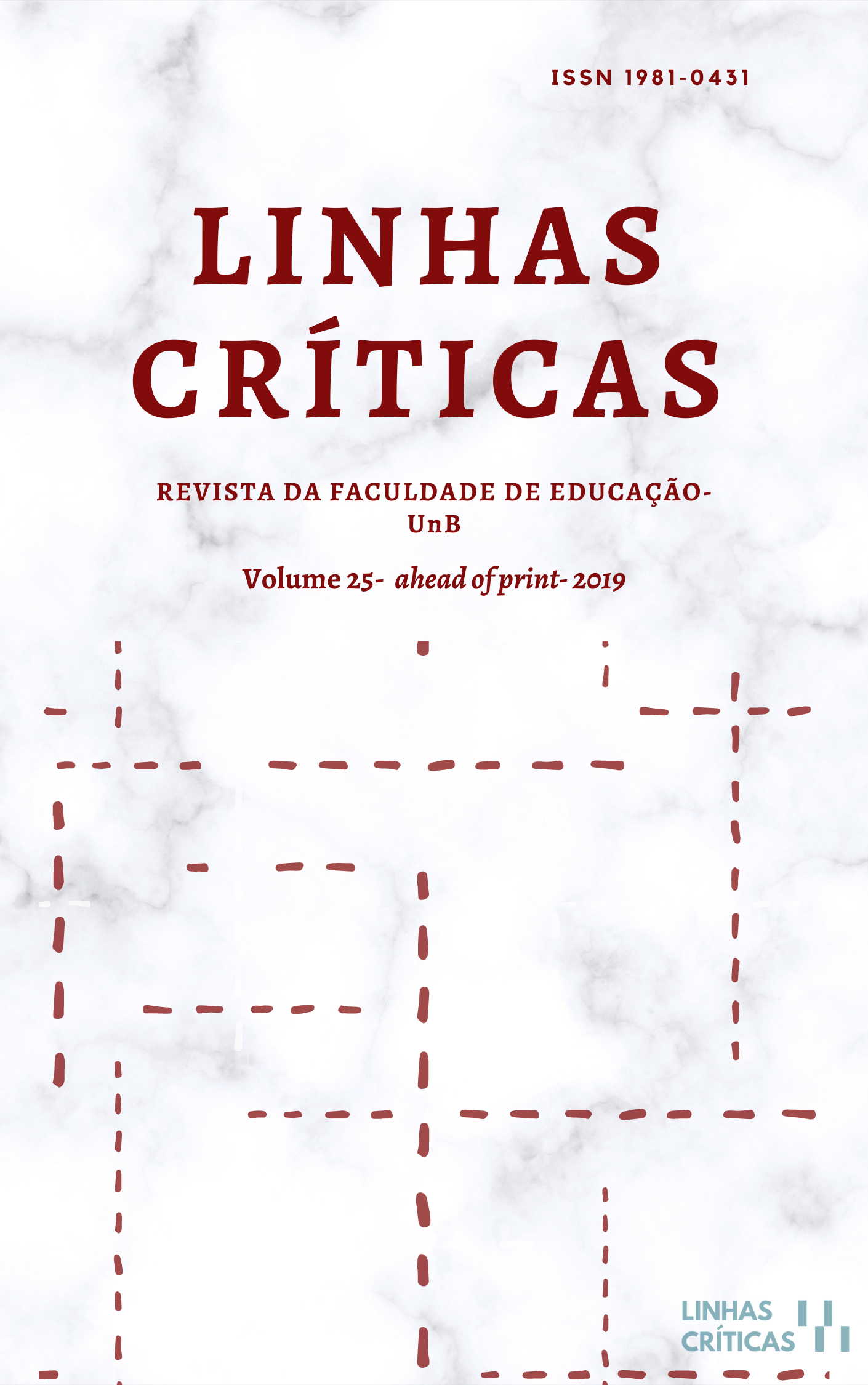Curriculum policies in Portugal: Conceptions and practices
DOI:
https://doi.org/10.26512/lc.v25i0.23562Keywords:
Educational policy, Curricular conceptions, School managersAbstract
This article analyzes opinions of school cluster managers in Portugal, enrolled in the implementation of the policy that considers the nationally prescribed curriculum as a project that needs to be recontextualised in each school. The corpus of analysis are interviews analyzed by using a content analysis technique. This showed that these school managers agree with the principles of curricular autonomy and flexibility, both in teaching action planning and in the curricular practices, having in mind that they provide a re-signification of the national curriculum. However, difficulties arising from political measures that do not articulate with each other are identified.
Downloads
References
Bakhtin, M. (1992). Marxismo e filosofia da linguagem (6ª ed.). São Paulo, São Paulo: Hucitec.
Ball, S. (2002). Reformar a escola/reformar professores e os terrores da performatividade. Revista Portuguesa de Educação, 15(2), 3-23.
Ball, S. J. (2001). Diretrizes Políticas Globais e Relações Políticas Locais em Educação. Currículo sem Fronteiras, 1(2), 99-116.
Bardin, L. (2009). Análise de Conteúdo. Lisboa: Edições 70.
Bolívar, A. (1999). O lugar da escola na política curricular actual, para além da reestruturação e da descentralização. Em M. J. Sarmento, Autonomia da escola: Políticas e práticas (pp. 157-190). Porto: Edições ASA.
Connell, R. (1999). Escuelas e justicia social. Madrid: Edicionaes Morata.
Connell, R. (2012). Just education. Journal of Education Policy, vol 27, nº 5, 681-683.
Fernandes, M. (2000). Mudança e inovação na pós-modernidade: Perspectivas curriculares. Porto: Editora Porto.
Ferraço, C.E. (2017). Práticas-políticas curriculares cotidianas como possibilidades de resistência aos clichês e à Base Nacional Comum Curricular (BNCC), Linhas Críticas, Brasília, DF, v.23, n.52, 524-537.
Fiorin, J. L. (2006). Interdiscursividade e intertextualidade. Em B. (Braith, Bakhtin: ou tros conceitos-chave, p. 161-193). São Paulo: Contexto.
Hargreaves, A. (1998). Os professores em tempos de Mudança. Portugal: McGra-Hill.
Leite, C. (2002). O Curriculo e o Multiculturalismo no Sistema Educativo Português. Coimbra, Portugal: Fundação Calouste Gulbenkian, 2002.
Leite, C. (2003). Para uma escola curricularmente inteligente. Porto: Edições ASA.
Leite, C. (2006). Políticas de currículo em Portugal e (im) possibilidades da escola se assumir como uma instituição curricularmente inteligente. Currículo Sem Fronteiras (BR), 6(2), 67-81.
Leite, C., & Fernandes, P. (2005). Relatório de Avaliação externa dos Agrupamentos de escolas do concelho do Porto. Porto: FPCE-UP: doc. policopiado.
Leite, C., & Fernandes, P. (2010). Desafios aos professores na construção de mudanças educacionais e curriculares: que possibilidades e que constrangimentos? Edu cação - PUCRS (BR), 33(3), 198-204.
Mainardes, J. (2006). Abordagem do ciclo de Políticas: Uma contribuição para a aná lise de políticas educacionais. Educação e Sociedade, 27, 47-69.
Pacheco, J. A. (2018). Para uma teoria curricular de mercado. Em J. A. Pacheco, M. C. Roldão, & M. T. Estrela, Estudo de Currículo (pp. 57-88). Porto: Porto Editora.
Portugal. (2017a). Despacho nº 5908/2017, de 05 de julho.
Portugal. (2017b). Despacho n.º 6478/2017, de 26 de julho.
Portugal. (2018a). Despacho n.º 6944-A/2018, de 19 de julho.
Portugal. (2018b). Decreto-Lei nº 55/2018, de 06 de julho.
Priestley, M., Biesta, G., & Robinson, S. (2013). Teachers as agents of charge: Teacher agency and emerging models of curriculum. Em M. Priestley, & G. Biesta, Reinven ting the curriculum: New trends in curriculum police and practice (pp. 187-206). London: Bloomsbury Academic.
Priestley, M., Biesta, G., & Robinson, S. (2015). Teacher agency: what is it and why does it matter? Em R. Kneyber, & J. Evers, Flip the system: Changing education from the bottom up (pp. 134-148). London: Routledge.
Sampaio, M. & Leite, C. (2017). From curricular justice to educational improvement: what is the role of schools’ self-evaluation? Improving Schools, 20, n. 1, 62-75 https://doi.org/10.1177/1365480216688553
Sampaio, M. & Leite, C. (2018). Mapping social justice perspectives and their relationship with curricular and schools’ evaluation practices: looking at scientific publica tions. Education as Change. Vol 22, No 1 (2018). https://doi.org/10.25159/19479417/2146
Sampaio, M., & Leite, C. (2015). A territorização das políticas educativas e a justiça curricular: o caso TEIP em Portugal. Currículo sem Fronteiras, v. 15, n. 3, 715-740.
Santos, A., C. dos, & Leite, C. (2018). Políticas curriculares em Portugal: fronteiras e tensões entre prescrição, autonomia e flexibilidade, Currículo sem Fronteiras, v. 18, n. 3, p. 836-856
Torres Santomé, J. (2013). Currículo escolar e justiça social: o cavalo de Tróia da edu cação. Porto Alegre: Penso.
Vilelas, J. (2009). Investigação: o Processo de Construção do Conhecimento. Lisboa: Edições Silabo.
Young, M. (2016). Por que o conhecimento é importante para a escola do século XXI? Cadernos de Pesquisa. Fundação Carlos Chagas, v.46, nº 159, 18-37.
Published
How to Cite
Issue
Section
License
Copyright (c) 2019 Linhas Críticas

This work is licensed under a Creative Commons Attribution 4.0 International License.
Authors who publish in this journal agree to the following terms:
-Authors maintains the copyright and grants the journal the right of first publication, the work being simultaneously licensed under the Creative Commons Attribution License which allows the sharing of the work with recognition of the authorship of the work and initial publication in this journal.
- Authors are authorized to enter into additional contracts separately, for non-exclusive distribution of the version of the work published in this journal (eg publish in institutional repository or as a book chapter), with acknowledgment of authorship and initial publication in this journal.
-Authorers are allowed and encouraged to publish and distribute their work online (eg in institutional repositories or on their personal page) at any point before or during the editorial process, as this can generate productive changes as well as increase the impact and the citation of published work (See The Effect of Free Access).



